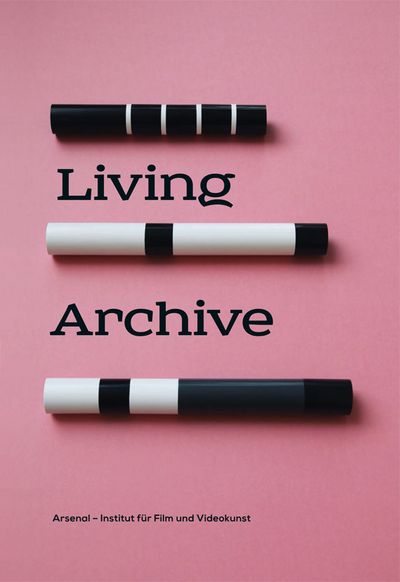Following a project duration of two years, 38 curators, filmmakers, artists and other researchers were invited to develop projects around the archive holdings. The idea was to consciously initiate projects that would carry out archival work as part of their development, so as to link research, preservation and publication in the context of contemporary curatorial and artistic practice. Living Archive thus represents the attempt to undertake archival work that does not serve self-preservation only but is contemporary, creates something new and enables new approaches. The project was funded by the German Federal Cultural Foundation and the Stiftung Deutsche Klassenlotterie Berlin.
There was a budget available for each participant, as well as material resources, including the Arsenal’s space with its editing tables, screening rooms, two cinemas, specialized staff, a film laboratory and technicians.
Every month, a colloquium to enable the exchange of information, as well as an accompanying discourse about Arsenal in particular and about how to deal with archives and history in general took place.
The Arsenal public screening was also connected to this event, offering, on top of screenings at the editing table, the chance to assess film copies on the screen as well as to discuss individual films in a larger group. The screenings, which provided an insight into the project’s diversity as well as into the Arsenal’s film archive itself, are carried on in the future.
The Living Archive festival took place in 2013, alongside a catalogue was published. Various other publications have also appeared as part of Living Archive: Madhusree Dutta and Ines Schaber’s KEYwording project took a look at the use of keywords in film catalogues, leading to the creation of 11 booklets that take the historicity and cultural anchorings of such key words into account. The NOW! (Extended) catalogue documents an exhibition created by Hito Steyerl’s class at the UdK Berlin on the film of the same name by Santiago Alvarez (Cuba 1967) and is also supplemented by several essays. At the end of the year, the first issue of Cimatheque's Cahier will be published in Cairo, a publication created by project participant Ala Younis which takes the films from the Arsenal archive as its starting point.
Thanks to Living Archive, 16 films could be added to our current distribution range as a result of digitalization, print restoration, contract extensions or new inclusions, including the anti-Apartheid film COME BACK, AFRICA (1958) by Lionel Rogosin, Laura Mulvey and Peter Wollen’s feminist film classic RIDDLES OF THE SPHINX (1977) as well as the unjustly forgotten work ORG (1968–78) by Fernando Birri. 13 new films and installations have also been created as part of Living Archive. In collaboration with Filmgalerie 451, five DVDs containing a total of 30 films by Riki Kalbe, Philip Scheffner, Deepa Dhanraj, Sheila McLaughlin and Lynne Tillman as well as Laura Mulvey and Peter Wollen have been released. Three additional DVD projects are also in preparation, including one on the still widely unknown experimental films by Berlin artist Ludwig Schönherr.
Two film programs were also put together for a tour through Germany. Project participant Merle Kröger initiated the World in Progress project, enabling regional arthouse cinemas in Germany to select films from a unique pool of over 30 titles acquired by arsenal distribution since 2007 which grapple with questions of life, survival, work, identity and vision in terms of both form and content. Sabine Schöbel curated a program of Spanish underground films that stood in opposition to the Franco regime entitled El cine de la Transición, which will also soon be touring through these cinemas.
Living Archive will continue to define the work of Arsenal and display how the medial conditions attached to working with film can be handled in suitably topical fashion. A large number of the participants have already announced that they will be seeking to continue their work with the Arsenal film archive once the official project phase has come to an end.
The participants of the project: Madeleine Bernstorff, John Blue, Ellen Blumenstein, Oksana Bulgakowa / Dietmar Hochmuth, Filipa César, Vaginal Davis, Martin Ebner, Heinz Emigholz, Entuziazm (Michael Baute, Volker Pantenburg, Stefan Pethke), Harun Farocki, Anselm Franke, Stephan Geene, Nanna Heidenreich, Tobias Hering, Brent Klinkum, Merle Kröger, Eunice Martins, Angela Melitopoulos, Avi Mograbi, Sabine Nessel, Winfried Pauleit, Constanze Ruhm, Susanne Sachsse, Ines Schaber, Philip Scheffner, Stefanie Schlüter, Sabine Schöbel, Marcel Schwierin, Marc Siegel, Hito Steyerl, Dorothee Wenner, Ian White, Nicole Wolf, Florian Wüst, Florian Zeyfang.
Participating Goethe-Institut grantholders: Madhusree Dutta (Bombay), Darrly Els (Johannesburg), Ala Younis (Amman), Joel Pizzini (São Paolo), Shai Heredia (Bangalore), Lauren Howes (Toronto).
"Living Archive – Archive Work as a Contemporary Artistic and Curatorial Practice" is funded by the German Federal Cultural Foundation and the Stiftung Deutsche Klassenlotterie Berlin. The grant program of the project Living Archive is funded by the Goethe-Institut.



